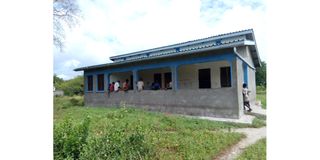Lamu residents want dispensaries closed because of terrorism in 2014 reopened

The Kiangwe dispensary in Lamu's Boni forest. It is the only health facility that is operational though it lacks drugs and is understaffed. Locals want officials to reopen four key dispensaries shut down eight years ago due to insecurity.
The Boni minority community living in Lamu’s terror-prone Boni forest want officials to reopen four key dispensaries shut down eight years ago due to insecurity.
The Milimani, Basuba, Mangai and Mararani health centres were closed in 2014 after Al-Shabaab fighters damaged them in attacks that left over 100 people dead.
Only the Kiangwe dispensary is operational, but it lacks drugs and is understaffed after most of its health workers fled vowing never to return.
More than 3,000 people live in the Boni forest villages. Most of them rely on free medical clinics held by Kenya Defence Forces (KDF) soldiers participating in Operation Amani Boni.
The operation, launched in 2015 to flush out Al-Shabaab militants believed to be hiding in the forest, also covers neighbouring Tana River and Garissa counties.
Residents who spoke to Nation.Africa complained they could not access health care.
Mr Noya Abuli, an elder in Basuba, said expectant women and children are the most affected. The women, he said, rely on the services of traditional birth attendants with no experience.
During emergencies, residents in these areas must travel across the Indian Ocean to King Fahad County Hospital on Lamu island, an expensive and time-consuming trip.
“The government has worked to restore peace and security. But we still urge officials to consider reopening our dispensaries here in Boni forest. We are suffering,” Mr Abuli said.
Ms Khadija Gurba, from Mangai village, said most women are unable to get proper maternity care in the affected areas.
“The government should also set up maternity wings for our women in every health facility. We have lost many mothers and babies because of the situation,” said Ms Gurba.
Basuba MCA Deko Barissa asked the state to establish a common health centre in Boni forest to help address the health challenges in the villages.
“For eight years, we haven't had a reliable health system in Boni forest. Some of us have been forced to turn to herbalists to survive. The government needs to urgently instal a common hospital either in Basuba or Kiangwe villages if opening our dispensaries is impossible,” said Mr Barissa.
Insecurity in Lamu began way back in 2011 when a British tourist was abducted by suspected Al-Shabaab militants from Kiwayu Village Resort in Lamu East.
As a result, Kenyan forces were deployed on the border with and inside Somalia under Operation Linda Nchi. Its sole objective was to seal off any entry points for gangs and prevent any militants from crossing into Kenya, after it was established that they were using porous border zones to enter.
Since then, Lamu County has had constant and numerous attacks, the worst being the Mpeketoni terrorist strike on June 15, 2014.
Over 100 people were killed by Al-Shabaab militants and property worth millions destroyed in Mpeketoni, Hindi, Kibaoni, Witu, Baure, Mangai and Basuba that year.





